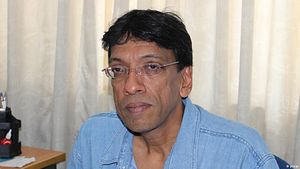The much anticipated UN Human Rights Council’s report on Sri Lankan war crimes is a grave indictment of the Sri Lankan government and the Tamil rebels, accusing both sides of crimes against humanity. The Council has called for a special court – part international, part local – to try those involved in war crimes and give justice.
Will the new regime in Colombo under Maithripala Sirisena succumb to international pressure and allow an outside agency to conduct inquiries and hold trials? Can justice be delivered by an indigenous trial court? What will the Tamil minority do if it does not get justice? Will the majority Sinhala population be willing to look at the past objectively and agree on reconciliation?
Speaking with The Diplomat’s Sanjay Kumar, Jehan Perera of the National Peace Council of Sri Lanka does his best to answer these questions. A political analyst and a prominent advocate for peace and reconciliation in Sri Lanka, Perera deconstructs the UN report and its meaning for the island nation.
What does the UN Human Rights Council’s report mean for Sri Lanka?
It means that Sri Lanka has to come to terms with its past. The past is not going to just go away. Ideally Sri Lanka should have looked at the past for the sake of its own people. Now, it is being forced to do so because of the unrelenting international pressure.
The UN report asks Sri Lanka to set up a special international court. How open is the country to complying with the international agency’s recommendation?
Sri Lanka has proposed a mechanism of its own. It has proposed it in consultation with the South African government and with other members of the international community. Sri Lanka has come up with its own answer, as presented to the UN human rights council.
My own feeling is that the UN proposal of a hybrid legal mechanism will not be workable because it is outside Sri Lanka’s legal framework and constitution. To change that would require a parliamentary majority which the government is unlikely to be able to get, even if the top leadership of the government were in favor of such a measure.
Second, such an intrusion by an international agency into Sri Lanka’s legal system would prove to be politically very controversial and would provide the opposition led by the former President [Mahinda] Rajapaksa with a good weapon to use against the government. So it is unlikely that the government will be able to implement the recommendation of the U.N. Human Rights’ Office.
How do you think the ethnic majority, Sinhalese, will react to the report?
I think at this stage the Sinhalese majority are not very aware of this report. It is all a little foreign to them. They will listen to what their political leaders say. As the political leadership is not in favor of international intervention, the majority will not support any international intervention.
How important is justice for a lasting peace in Sri Lanka?
Without justice for the minority community this ethnic conflict will continue to fester. So the Tamil minority in particular has to be won over by the government, by the Sri Lankan state. It can only be won over if they feel that the Sri Lankan state is treating them fairly. There needs to be political reform and there also needs to be some form of accountability, some form of truth telling about what actually happened or the wrongs that happened during the war. This is necessary. The question is whether the Sri Lankan domestic processes is strong enough to do this. That is only way forward. Sri Lanka’s domestic process has to become strong enough, and this international external pressure is good [for that purpose].
In what way will reconciliation come to Sri Lanka?
I think there is more reconciliation today than a year ago. We are moving in the direction; there is an agreement that the truth must come out. The speed at which we want reform is different. There is agreement at this time that truth is important, that reform is important, and that we must live together and respect each other’s community. This feeling is there among the people. We have to find an appropriate mechanism to make this a reality. The desire is there, there is a desire not to fight each other. We have to find the correct domestic mechanism to make it happen. That is the challenge. We all are looking in the same direction.
What has the present government been doing to bring justice ?
They have started giving land, they have started consulting with the Tamil political leadership more. They are interfering less in the decisions of the provincial government in the Tamil-dominated north. They have put a restraint on the military control that existed in the past. They have reduced that. So there has been a move in the right direction.
Do you think there is a possibility that former President Mahinda Rajapaksa could be held accountable for war crimes?
Mahinda Rajapaksa is regarded by most of the majority Sinhalese population as a great hero for having won the war. At the same time, a large number of Sinhalese feel that during his period in the government, corruption and illegal acts took place. They know that. I think people will be more prepared to see Rajapaksa held accountable for the criminal and corrupt acts that took place under him. They would be less prepared to punish him for the war crimes. So if he is punished, it will be probably be for criminal and corrupt acts rather than for war crimes.

































